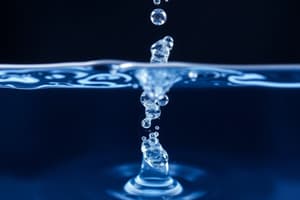Podcast
Questions and Answers
Explain the cohesive forces of water and its role in surface tension.
Explain the cohesive forces of water and its role in surface tension.
Cohesive forces are responsible for holding water molecules together, creating surface tension which resists rupture when placed under stress.
Why is water considered a universal solvent?
Why is water considered a universal solvent?
Water is considered a universal solvent because it has the unique ability to dissolve many polar and ionic substances.
Describe the significance of water's high heat of vaporization in biological processes.
Describe the significance of water's high heat of vaporization in biological processes.
Water's high heat of vaporization allows for processes like sweating, where water evaporates to cool the body.
What gives water its polarity?
What gives water its polarity?
Explain why ice floats on water despite being a solid.
Explain why ice floats on water despite being a solid.
Explain the significance of hydrogen bonding in water.
Explain the significance of hydrogen bonding in water.
What are the adhesive properties of water and why are they important for life?
What are the adhesive properties of water and why are they important for life?
What role does water's high heat capacity play?
What role does water's high heat capacity play?
Explain why water cannot dissolve non-polar molecules like oils.
Explain why water cannot dissolve non-polar molecules like oils.
How does water's solvent properties benefit living organisms?
How does water's solvent properties benefit living organisms?
Differentiate between a polar covalent bond and a covalent bond in the context of water.
Differentiate between a polar covalent bond and a covalent bond in the context of water.
Why is water essential for life on Earth?
Why is water essential for life on Earth?
Flashcards are hidden until you start studying
Study Notes
Properties of Water
Water is a polar inorganic compound that is essential for life on Earth. It is a tasteless, odorless liquid that is nearly colorless at room temperature, with a hint of blue. Water is a universal solvent and the solvent of life, as it has the unique ability to dissolve many polar and ionic substances. It is the most abundant substance on the surface of Earth and is found in all forms of life.
Polarity and Hydrogen Bonding
Water molecules are polar due to the electronegative nature of oxygen, which attracts electrons more strongly than hydrogen. This results in a bent molecular structure with partial positive charges on the hydrogen atoms and partial negative charges on the oxygen atom. The hydrogen atoms are also attracted to other water molecules, forming hydrogen bonds. These hydrogen bonds are responsible for many of water's unique properties.
Solvent Properties
Water is an excellent solvent because it can dissolve polar and ionic substances. This is due to the polar nature of water molecules, which form hydrogen bonds with other polar molecules. This property is crucial for life, as it allows for the transportation of nutrients and waste products within organisms.
Heat Capacity and Heat of Vaporization
Water has a high heat capacity, which means it can absorb a large amount of heat before its temperature begins to rise. This property helps regulate temperature in the environment, keeping the temperature of water in bodies like ponds and lakes relatively constant. Water also has a high heat of vaporization, which is the amount of energy required to change liquid water to water vapor. This property is important in processes like sweating, where water evaporates to cool the body.
Cohesive and Adhesive Properties
Water has cohesive forces, which are the forces that hold water molecules together. This is responsible for surface tension, the tendency of a liquid's surface to resist rupture when placed under tension or stress. Water also has adhesive properties, which allow it to stick to other substances. These properties are essential for life, as they allow for the transportation of nutrients and other substances against the force of gravity.
Less Dense as a Solid
Water is less dense as a solid than a liquid. As water freezes, the molecules form a crystalline structure that spaces the molecules further apart than in liquid water. This means that ice is less dense than liquid water, which is why it floats. This property is important for life, as it allows bodies of water to remain liquid and not freeze solid.
Common Misconceptions
- Water is not a universal solvent: While water can dissolve many substances, it cannot dissolve non-polar molecules like oils.
- Water is a polar covalent bond: Water has a polar covalent bond, where the electrons are shared but oxygen pulls the electrons closer, creating a partial negative charge on the oxygen side and a partial positive charge on the hydrogen side.
- Water is a coevolant bond: No, water is a polar covalent bond.
Studying That Suits You
Use AI to generate personalized quizzes and flashcards to suit your learning preferences.




